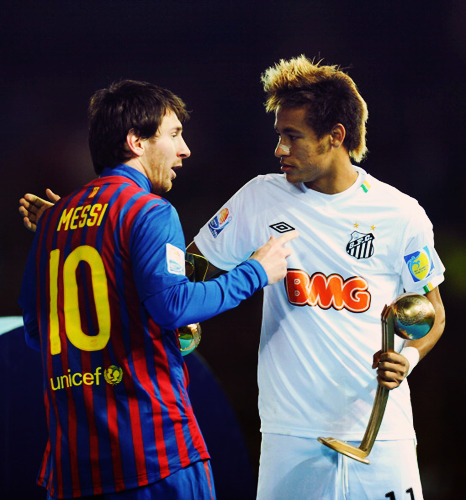Unquantifiable Genius: Neymar as Messi
Unquantifiable Genius: Neymar as Messi


By Eric Beard
“Pelé doesn’t know sh*t.”
That was Sid Lowe’s response to James Richardson’s teasing statement on The Guardian’s Football Weekly Podcast. Richardson, of course, was referencing Pelé’s opinion that Neymar is better than Lionel Messi. With Pelé getting up there in age, Sid might be on to something. But that’s neither here nor there. The fact is that Neymar couldn’t do sh*t to stop Barcelona from winning the Club World Cup.
Player comparisons are far too often full of intangibles that draw upon the weak base of power that language possesses. Language is expected to casually unveil a dramatic truth when poetically expressed. However, according to Pep Guardiola, “there are no adjectives” to describe Messi. Language is sh*t next to Messi.Words are sh*t, next to a 24-year-old from Rosario. He is “extraordinary” in dozens of matches every year, and yet his brilliance is invariably unique from one match to another. But if you describe dribbling nine players and chipping the keeper with the same superlative as a hat-trick at the Bernabeu, you need not fear the wrath of Señor Guardiola.
Rather, Pep should understand the deficiencies of human linguistics. But this is not about Messi. It’s not about Neymar, either. The question we’re faced with is the power of an individual, even a phenomenon. Before we go any further, let’s recognize that “phenomenon” is a word football fans can comprehend and associate with Neymar and Messi. But let’s also recognize that it’s a word that doesn’t mean sh*t in defining Neymar or Messi. The subjectivity of definition is clouded by the illusion, the false formation of a collective consciousness. If this were the case, if we could adequately identify the essence of brilliance of another through millions of opinions, then we would not be left speechless listening to Messi being described as a “wonderful salmon [rising] out of the stream.”
That is not to say that our subjectivity, when supported by reason, cannot gain anything through comparison. If we have Emile Heskey standing next to Lionel Messi, we can define Heskey as tall and stagnant and Messi as short and agile. Similarly, in the context of the empirical spectrum of ability we have developed over the past century in football, we can define Leo as a “genius” (in terms of ball control, pace, finishing, etc…) in relation to Emile. Conversely, we can define Emile as sh*t in relation to Leo for the very same reasons (sorry, Emile. Thanks for being such a team player on this activity).
Again, we return to “O Rei” being accused of not knowing sh*t. What a disgrace! Surely this is heresy to the Gods of Football (yes, Pelé is probably one of them). If definitions of “better” can be subjective, was Sid Lowe within his right to cry foul on Pelé?
No, at least not based upon Pelé’s opinion of the two players. Neymar and Messi have both demonstrated characteristics pertaining to footballing geniuses time and time again. Assisting genius in the hope to identify superiority are statistics, which leads to even more support for Messi in this case. Neymar has been brilliant more often than not, but the strongest trait statistics tend to stand up for is consistency. Throughout his career, Lionel Messi has on average scored more goals, made more assists, and won more trophies than Neymar.
But when describing a genius, whether it is a painter, a musician, a filmmaker, a philosopher, an author, or an athlete, consistency does not hold the trump card. A tremendous goal or a stunning bit of skill cannot be equated into ten assists or a trophy. Similarly, Harry Potter cannot objectively be deemed as a better book than The Brothers Karamazov because it won more awards and sold more copies. Picasso cannot be declared as less brilliant than Francisco Goya because Pablo’s work fluctuated all over the place. Woody Allen’s Manhattan cannot be equated into one hundred Vicky Cristina Barcelona’s. You get the point.
- There have been games when Messi has performed better than the average Neymar performance.
- There have been games when Neymar has performed better than the average Messi performance.
- Messi has redefined himself by making the average Messi performance better year after year. Neymar has done exactly the same.
- Therefore, Messi is better than Neymar, but also sometimes not as good as Neymar. Similarly, Neymar is better than Messi, but also sometimes not as good as Messi.
If there’s anything to take from this paradox, maybe it’s that Neymar and Messi are more similar than we think. Both players are geniuses, but have not been able to escape being called sh*t. With Argentina, Messi magically transforms into sh*t Messi. Against Barcelona, Neymar became sh*t Neymar.
Even Pelé could not have done anything to stop Barcelona in Japan. Maradona (as a player) could not have done anything to beat Germany in South Africa. Santos were sh*t compared to Barcelona. Argentina were sh*t compared to Germany.
But the use of the transitive property to then state that Messi is not good enough to win a World Cup or Neymar is not good enough to play for Barcelona is a fallacy, specifically the Fallacy of Honor by Association (i.e. Barcelona is inarguably better than Neymar’s team, therefore Neymar is not good enough to play for Barcelona). But the art of avoiding such inaccurately derived generalizations has eluded some of the best professionals in sports. As long as there are tabloids, there will be nonsense. Can nonsense be countered? Of course, but maybe it requires a level of egotistical pride. Maybe it requires an understanding of oneself as an intangible. Maybe the humility Neymar and Messi seem to possess does not always work towards their benefit.
Maybe even geniuses could learn a thing or two from someone like “the Zlatan” after all. But nevertheless, genius is genius. Words only strive to portray this.







